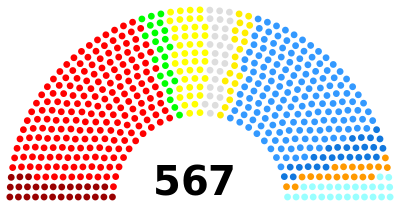| |||||||||||||||||||||||||
All 567 seats to the European Parliament 285 seats needed for a majority | |||||||||||||||||||||||||
|---|---|---|---|---|---|---|---|---|---|---|---|---|---|---|---|---|---|---|---|---|---|---|---|---|---|
| Turnout | 56.8% | ||||||||||||||||||||||||
| |||||||||||||||||||||||||
 Post-election composition of each member state's delegation | |||||||||||||||||||||||||
The 1994 European Parliamentary election was a European election held across the 12 European Union member states in June 1994.
Contents
This election saw the merge of the European People's Party and European Democrats, an increase in the overall number of seats (567 members were elected to the European Parliament) and a fall in overall turnout to 57%.
The five years which had passed since the previous election had seen enormous political upheavals across the continent. These changes included the end of communism in Europe, German reunification, the dissolution of the Soviet Union, the Velvet Divorce in Czechoslovakia and the breakup of Yugoslavia. The integration of five former East German states and Berlin into the Federal Republic of Germany had constituted the first physical expansion of the EC since 1986. The end of the Cold War meant three politically neutral states in Europe had begun a process of acceding to the EU that would culminate in the 1995 enlargement of the European Union. The EU itself had assumed its current name through adoption of the Treaty of Maastricht in 1993.







